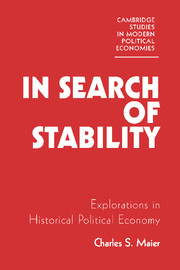Introduction: Political economy and history
Published online by Cambridge University Press: 15 December 2009
Summary
With patience historians may resolve a few of the issues that arouse their curiosity. Eventually they tire of many they cannot settle. Finally they keep returning to still others that cannot easily be solved but do not lose their intellectual or moral fascination: the persistent questions that get under the scholar's skin. From one angle or another, over a period of fifteen years, the pieces collected here have addressed one of these besetting issues, namely, how are the inequalities inherent in modern economic organization defused or overcome as a source of explosive social conflict? This inquiry includes several interlocking questions:
What mixture of constraint and ideological legitimation, what forms of representation, what promises of material reward support political and social stability?
Under what circumstances is stability threatened; under what circumstances is it recovered?
How does the alignment of power among nation-states influence the tensions and rivalries within national societies?
These common issues provide one reason for publishing this diverse collection of essays in a single volume. A further incentive is that several of the pieces appeared in journals or conference proceedings that political scientists and economists were more likely to encounter than fellow historians. I like to think that, although they are essentially historical, that is, more intent on explaining specific past outcomes than generalizing about political or economic development as recurrent possibilities, some of the essays do cross disciplinary frontiers. Though not really economic history, some are informed by economic issues; though not really political science, some try to provide typologies of political groups and behavior.
- Type
- Chapter
- Information
- In Search of StabilityExplorations in Historical Political Economy, pp. 1 - 16Publisher: Cambridge University PressPrint publication year: 1988
- 1
- Cited by

